UNHCR concerned over ending of rescue operation in the Mediterranean
This is a summary of what was said by UNHCR spokesperson William Spindler – to whom quoted text may be attributed – at today's press briefing at the Palais des Nations in Geneva.
UNHCR is concerned over the announcement of the ending this month of the Italian operation Mare Nostrum without a similar European search and rescue operation to replace it. This will undoubtedly increase the risk for those trying to find safety in Europe, and could lead to more refugees and migrants perishing at sea. It is estimated that 3343 people have lost their lives this year while making such journeys, 2755 of them since the start of July.
UNHCR has welcomed Mare Nostrum, which has contributed to the rescue of around 150,000 refuges and migrants since it began a year ago as a response to two tragedies off the coast of Lampedusa, where over 600 refugees and migrants died. Today, UNHCR reiterates its call for Europe to commit more resources to rescue at sea in the Mediterranean.
It is critical that the long-established tradition of rescue at sea is upheld by all. UNHCR also recognizes the efforts made by many commercial vessels - this year alone they have contributed to the rescue of about 37,000 people. To the extent possible, such rescue must ensure minimal financial impact on the shipping industry. Predictability on places for the disembarkation in safety of those rescued is also required.
In addition, Europe needs to step up efforts to provide credible legal alternatives to dangerous voyages to protect people from the risks of traveling with smugglers. The collective response needs to maintain a strong capacity to rescue people at sea and increase safer ways for refugees to find safety in Europe, including enhanced resettlement, other forms of humanitarian admission and private sponsorship schemes. UNHCR is also calling on European governments to do more to facilitate family reunification and use programmes such as student or employment visas to benefit refugees.
The level of desperation among many of those involved, fleeing war, persecution and violence, including from Syria require our concerted efforts to respond. This trend began in June and July last year, before Mare Nostrum was established, and has continued in 2014. In addition, an increased number of women, children, including many unaccompanied, and elderly people are taking to dangerous sea routes. They face greater risks, are more vulnerable to abuse and have specific needs that require assistance after they are rescued.
These challenges cannot be addressed by a few states alone; a joint European response is needed, based on collaboration among states and EU support. These efforts also need to ensure additional initial reception facilities, adequate reception conditions, assistance in processing as well as identifying solutions for those in need of international protection
For more information on this topic, please contact:
- In Rome, In Rome, Carlotta Sami on mobile +39 335 679 4746
- In Rome, Federico Fossi on mobile +31 349 0843461
- In Geneva, William Spindler on mobile +41 79 217 3011
Related news and stories
First UNITY Cup shows the power of football to connect refugees and hosts
Scholarships in Italy allow refugees to dream again
Relief for asylum seekers offered a new life outside Libya
Evacuation flights from Libya to Italy bring hope for vulnerable asylum seekers
UNHCR and Council of Europe discuss statelessness, urge States to uphold the right to a nationality in Europe
UNHCR warns of mounting refugee and migrant deaths in the Central Mediterranean
-

For displaced Venezuelans, regularization is the key to building productive lives
23 Jun 2021 Far-reaching regularization schemes in Colombia and Ecuador are providing a lifeline to Venezuelan refugees and migrants who long to become self-sufficient. -
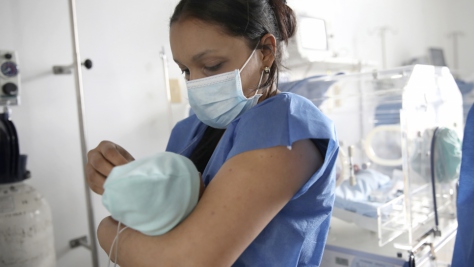
UNHCR warns of vaccine gap risk for world's stateless
22 Jun 2021 -
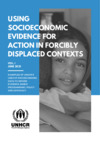
Using Socioeconomic Evidence in Forcibly Displaced Contexts Vol 1 June 2021
22 Jun 2021 This is a compilation of examples of UNHCR's uses of socioeconomic evidence in forcibly displaced contexts. -
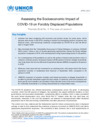
Assessing the Socioeconomic Impact of COVID-19 on Persons of Concern in Lebanon
22 Jun 2021 Based on high-frequency phone surveys conducted by UNHCR, these thematic notes analyses how COVID-19 has impacted PoC populations in a few key countries. -
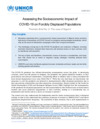
Assessing the Socioeconomic Impact of COVID-19 on Persons of Concern in Nigeria
22 Jun 2021 Based on high-frequency phone surveys conducted by UNHCR, these thematic notes analyses how COVID-19 has impacted PoC populations in a few key countries. -
21st Berlin Conference on Refugee Rights, 21 June 2021, Speech by Assistant High Commissioner for Protection Ms Gillian Triggs
21 Jun 2021 -
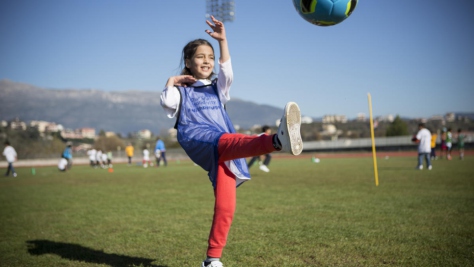
UEFA and UNHCR team up to congratulate UEFA Football and Refugees Grant Scheme winners
21 Jun 2021 On occasion of World Refugee Day UEFA and UNHCR recognise six national associations who have helped refugees integrate into society -
Previous consultations with NGOS
-

Moving forward on the #CleanEnergyChallenge
21 Jun 2021
